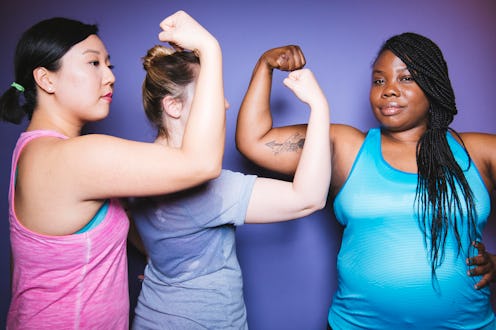
Have you ever felt "unfeminine"? Our society often fosters a narrow idea of what it means to be a man or a woman (and erases non-binary people entirely), so sometimes, it's hard not to. And we often feel this way about things that don't really make a woman unfeminine — because "femininity" inherently means nothing at all and can subjectively mean anything you want.
The standards our culture frequently imposes on women are so strict that nobody can be perfectly feminine. That would mean never speaking your mind, valuing your work, prioritizing yourself, or fulfilling any of your physical needs. It would mean being a ghost of a person. Similarly, being perfectly masculine would mean not showing emotions, having deep relationships, or valuing family. So why are these things we're taught to aspire to?
There's nothing wrong with being "unfeminine" or "unmasculine" in the first place — or with being feminine or masculine, for that matter — because femininity and masculinity are essentially made-up social constructs; you can re-make them up however you want, whenever you want. But even if being feminine were an essential part of being a woman, the following behaviors would not be of concern. The truth of the matter is that they don't make you any less of a woman. End of story.
1. Having Physical Strength
Women are taught to be "toned," yet if they get too strong, they're too often perceived as undesirable. And that's not because of any biological principal of human attraction — it's because of gendered power dynamics. We value strength more in men because we value power more in men. Discouraging women from being strong, though, keeps women in an inferior position. As Shirley Castelnuovo and Sharon R. Guthrie argue in Feminism and the Female Body: Liberating the Amazon Within , differences in physical strength are upheld by and perpetuate patriarchy.
2. Having Bodily Functions
The notion that women don't pee, poop, sweat, or exhibit any other bodily function — or that they do but should keep it all a secret so other people can pretend they don't — is alive and well, especially in romantic relationships. One survey by Mic found that women are less likely than men to be the first one to fart in front of a significant other. Funny as this finding is, it also reveals something less funny: We shame women for bodily functions that everyone has. It doesn't make a woman less of a woman to have a body. If anything, it makes her more of a woman, since it makes her human.
3. Having A Sex Drive
The notion that it's men's role to have sexual desires and women's role to decide if these desires get indulged is not only completely sexist, but also fairly recent. In Western cultures, it used to be "feminine" to have a high sex drive until around the 19th century. The current standard shames women for having normal bodies and puts undue responsibility on women's shoulders: They're judged for every sexual encounter they get involved in. It's not great for men, either; they're depicted almost as natural disasters that can't contain themselves.
4. Not Wanting Kids
People don't tend to think twice if a man doesn't have kids, but once a woman reaches a certain age, people start telling her that her biological clock is ticking and she'd better start thinking about "locking someone down." Women are made to feel like there's something biologically wrong with them if they don't want kids and that they're incomplete women if they don't have them. But being childfree makes sense for many people, lacking "maternal instinct" doesn't mean anything's wrong with you, and a woman is complete without a baby.
5. Being Tough
Women are supposed to be emotional and "soft," while men are supposed to be hardhearted and rational. This can lead to negative stereotypes about "aggressive" women in the workplace, as well as social judgments of women who are less emotional and more assertive. Women should have just as much of a right to be unemotional without being called "cold" as men have to be emotional without being called weak, because neither is inherently feminine or masculine.
Images: Andrew Zaeh for Bustle; Giphy (3)